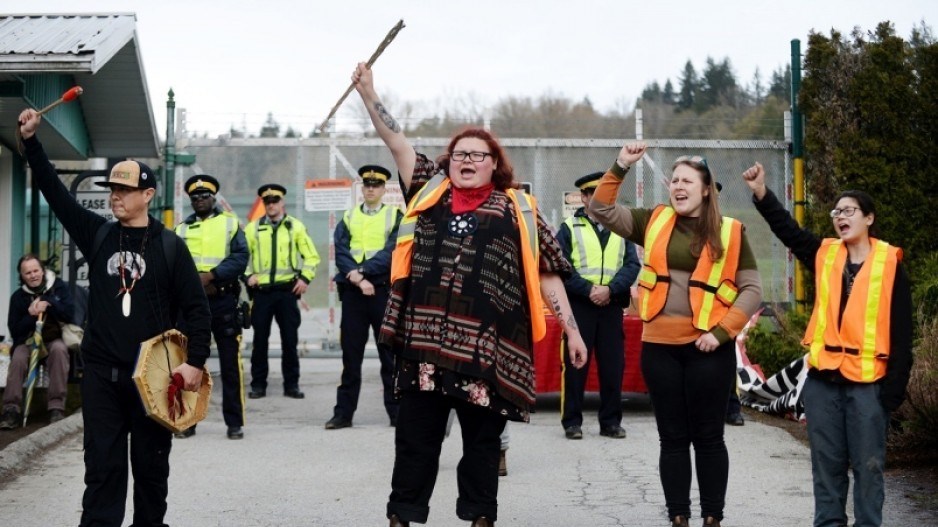Alberta’s long-delayed inquiry into the foreign funding of anti-oil and anti-pipeline activism in Canada was released today with the conclusion that mostly American philanthropy groups bankrolled Canadian activism to the tune of $1.3 billion.
The inquiry, led by Steve Allan, used the research of Vancouver’s Vivian Krause as a starting point. Krause had looked at American tax donation data to trace the flow of American dollars into Canada to fund anti-fossil fuel and anti-pipeline activities, like the Tar Sands campaign, the stated goal of which was to halt or slow the expansion of oil sands expansion in Alberta.
The Tar Sands campaign was jointly sponsored by Rockefeller Brothers Fund, Corporate Ethics International, the Pembina Institute, and National Resources Defence Council, according to the Allan inquiry.
“The report confirms the existence of well-funded foreign interests that have been waging a decade-long campaign of misinformation with the goal of landlocking Alberta’s oil and gas,” a summary of the report states.
A good deal of the activism took place in B.C. and was aimed at the Trans Mountain pipeline expansion. Some of the activism took the form of court challenges.
Allan notes that he found nothing illegal about the funding of Canadian environmental groups by mostly American philanthropical groups.
Missing from the inquiry is any analysis of whether the funding of anti-fossil fuel activism in Canada by American donors was disproportionate to what environmental groups received in the U.S. for anti-pipeline and anti-fracking campaigns.
While the activism undoubtedly led to delays of projects like the Trans Mountain pipeline – since the funding and the activism included a host of legal challenges – it’s not clear that it was solely responsible for shutting own oil and gas activities in Canada, despite claims by environmental groups that it did.
“While anti-Alberta energy campaigns may have played a role in the cancellation of some oil and gas developments, I am not in a position to find that these campaigns alone caused project delays or cancellations,” Allan writes in his report.
"There is no doubt that these campaigns have occurred in an environment of reduced investment in oil and gas projects, at least since 2014 when global oil prices fell by almost half and other economic factors were at play. Much of the reduced investment is therefore due to natural market forces, but anti-Alberta energy campaigns have played a role.
"Many ENGOs have taken credit for the success of their efforts in the cancellation of a number of projects, including Keystone XL, the Teck Frontier Oilsands Mine, the Northern Gateway Pipeline, Energy East, Statoil’s Corner Oil Sands Project, and Shell’s Carmon Creek Oil Sands Project, and many ENGOs remain determined to stop the Trans Mountain Pipeline, Enbridge’s Line 3 and Enbridge’s Line 5."
The Allan inquiry was struck in 2019. It was delayed in releasing its report by two years and experienced budget increases. The period covered in the inquiry was 2003 to 2019. Allan employed Deloitte to help trace grants. One of the problems discovered in establishing a paper trail is that some environmental groups re-grant some of the funding they receive to other groups.
"When these funds are re-granted, they are not accounted for by the recipient entity as foreign funds received," the inquiry notes. "These funds have essentially “lost their character” as foreign funds, which means the total foreign funding to Canadian ENGOs is likely more widespread than is reflected in either U.S. or Canadian open-sourced materials."
The inquiry identifies 13 foreign philanthropical groups, mostly American, that provided funding to Canadian environmental organizations and "envirolegal" groups like Ecojustice and West Coast Environmental Law. Canadian groups receiving funding (many of them B.C.-based) included the Pembina Institute, Greenpeace Canada, the David Suzuki Foundation, the Sierra Club, Dogwood Initiative, LeadNow, Tides Canada (since renamed MakeWay) and Raincoast Conservation Foundation.
Ecojustice calls the Allan inquiry “a colossal waste of time and money" that amounted to not much more than an "expensive Google search."
"Despite the four deadline extensions and the $3.5 million cost to taxpayers, all the information cited in the document appears to have resulted from web searches and can easily be found on Ecojustice’s website and in public communications and documents," Ecojustice says in a press release.




